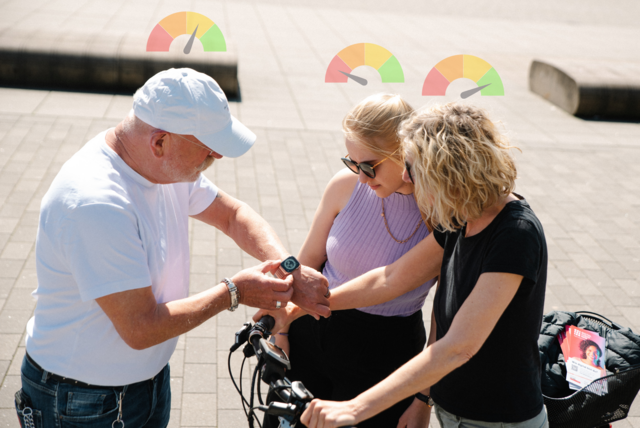Login
What is social scoring? - About the most dangerous form of tracking
Article content at a glance
You are monitored by various tracking methods (e.g. cookies, IP addresses, app permissions) when surfing and on social media.
A certain degree of tracking is necessary for functions and optimization, but often exceeds privacy limits, for example through personalized advertising, data sales or social scoring.
The latter can lead to discrimination, particularly drastic in the Chinese system.
In Germany, the GDPR largely prevents such a system.
Ad blockers, privacy settings and conscious use of apps can help to prevent tracking.
When surfing the internet and using social media, you are never completely unobserved. Websites and apps collect data about your behavior, such as your purchases, who you have communicated with or which other websites you have previously visited. This so-called "tracking" happens in various ways and is harmless to a certain extent, but can also massively overstep the boundaries of privacy. Here you can find out what is done with the data and what you can do about it.
What forms of tracking are there?
There are various technologies and methods that are used for tracking. The nasty thing is that users often even agree to this "observation" because they are misled by misleading consent options or do not know exactly what will happen to their data if they agree.
- Cookies: These are small text files that are stored on your computer by websites. They recognize you on your next visit and save your settings. You can find out exactly how this works in our explanatory video (LINK) or in our article (LINK).
- IP addresses: Every internet connection has a unique IP address, comparable to a postal address. This can be used to roughly determine your location and track your usage behavior.
- Web beacons: These are invisible images or codes on websites or in emails that also collect information about your behavior.
- Tracking tools: Many companies use special software or services (analysis programs) to collect and evaluate data about users.
- App permissions: The permissions that you grant to the apps on your smartphone or tablet are less disguised. This allows you to grant an app certain access, e.g. to your camera, microphone or contact list.

How much tracking is okay?
To a certain extent, it is understandable that websites and apps want to find out something about their users.
Enabling functions: Storing cookies is sometimes technically necessary for the website to function as it should. For example, if you want to shop online, the digital shopping cart must always remember what you have already put in it, even if you continue to browse other subpages of the online store in between. Apps also have similar technical requirements: If you want to send a voice message, for example, the app needs access to your microphone - of course it does.
Optimization of the website or app: Many providers want to see how visitors move around their site in order to make it more user-friendly. This is legitimate as long as the collection of usage data remains within reasonable limits.
But neither on websites nor in apps is it necessary for you to always agree to all data storage and grant all access! Companies also track users for other reasons.
When is tracking no longer okay?
Personalization, filter bubbles and echo chambers
Many websites and apps collect data about you in order to offer you tailored advertising or content that matches your interests (so-called "personalized" ads or content). If you realize that you may be directed to buy a product or read an article, it's not a nice feeling, and it can also have other negative consequences: The analytics, known as profiles, that are created about you can be skewed or incomplete. For example, if a site recognizes that you have searched for a specific topic, it quickly creates the impression that you are only interested in this topic - even if this is not true. This causes you to slip further and further into so-called "filter bubbles", in which you are only shown similar posts, or into "echo chambers", in which you always encounter similar opinions online. And if you only receive this one-sided information, you may automatically lose touch with other topics and perspectives. In the beginning, you may not have been interested in this direction at all, but after reading up on the topic, you suddenly do. This may be harmless if it's an opinion on the best cat food in Germany, but it can become a danger to society if radical views on religious, political or ideological topics are formed or solidified in this way.
Data misuse, market research and manipulation
Sometimes website and app providers collect data about you in order to sell it to other companies. If these buyers are criminals, there is a risk that your data could fall into the wrong hands and be used for various scams, such as identity theft.
Many providers also collect data about you on behalf of third parties and pass on information about your interests and usage behavior to market research institutes. In the highly competitive market for advertisements, spaces are also auctioned off in what is known as real-time bidding, a Google auction model.[1] When a website or app registers your interests, this information is passed on to advertising companies, which sell the ad spaces to the highest bidders in milliseconds. The ads are usually broadly targeted to the audience currently browsing the site (e.g. targeted to women, men, younger people or older people). However, if you see matching ads for a topic you have just researched, this could be more than just a coincidence and could be due to the interaction between trackers and advertising companies.
Social scoring and the loss of privacy
Social scoring refers to a system that collects and evaluates information about people in order to give them a score, e.g. to calculate a risk. The data analyses of insurance companies and credit institutions therefore often border on the practice of social scoring.
Many car insurance companies, for example, combine various data points to identify high-risk customers. Important data for identifying these include the crime rate in the district, accident figures at the place of residence and the driver's state of health. The latter is difficult to determine, which is why they rely on data from websites, apps or social media. Public photos of parties with high alcohol consumption, for example, are not exactly an advantage. In addition, car insurance companies offer programs where premiums are based on driving behavior, which is monitored by so-called telematics devices in the car[2].
Health insurance companies also make use of data from websites and social media, such as lifestyle advice on diet, exercise, tobacco and alcohol consumption, and advertise special benefits if customers have their fitness monitored via health apps, smartwatches and fitness bracelets.[3] Another example of assessment based on a wide range of data is the calculation of creditworthiness by "SCHUFA" (a company that analyzes profitability).
One of the biggest dangers of such assessments is that people can be treated unfairly based on their score and, for example, have difficulties getting a loan, finding an apartment or having to pay higher insurance premiums than others due to their low score. Analyzing data can quickly lead to discrimination. How exactly these systems arrive at their scores is usually not disclosed and remains a company secret.

Social scoring in China
The social credit system in some major cities in China is a concrete and very extreme example of social scoring. It was developed to evaluate and control the behavior of citizens. In this system, various data about people is collected, such as:
- Financial behavior: Does the person pay their bills on time? Do they have debts?
- Social interactions: How does the person behave in public? Are they friendly or rude? Do they visit their family regularly?
- Online behavior: What does the person buy on the internet? Are there many purchases? Are they useful or useless? What content do they consume?
- Misbehavior: Does the person cross a red light? Did they park incorrectly? Or are they critical of the government?
This information is then used to assign a score. A high score can bring advantages, such as faster approval for loans or better job opportunities. A low score, on the other hand, can mean that you can no longer get certain things - for example, it can be more difficult to buy a plane ticket or rent an apartment. The Chinese government uses this system to keep citizens in line with its values and party line. [4], [5]

Is massive social scoring also to be expected in Germany?
In Germany, there is no official system for social scoring, as is practiced in China, for example. This is largely due to the fact that Western culture has a different understanding of privacy, but also because of the laws in Germany and the EU: among other things, the General Data Protection Regulation (GDPR) protects citizens' personal data and restricts the possibilities for data collection and use.
If people feel that they are under constant surveillance and that their data could be used against them, this can reduce trust in society and in political institutions - most companies and politicians are aware of this. Nevertheless, the practices of insurance companies and credit institutions are similar to the models in China. Technically, it would already be possible to collect information about people from various websites, apps and public surveillance cameras and carry out such analyses, but fortunately there are certain limits at a legal and ethical level in this country - which we hope will remain the case[6].
What can I do to prevent tracking and protect my data?
5. protect your privacy on social media
Check the privacy settings of your accounts and don't share too much personal information.
6. do the #DigitalCheckNRW
You can check your digital skills and learn a lot with our online test. Start here.
Sources
[1] Real-time bidding (RTB) explained simply: definition, advantages and disadvantages:
https://datenbasiert.de/real-time-bidding/
[2] Social scoring: telematics data & car insurance:
www.ecolaw.de/social-scoring-telematik-daten-die-kfz-versicherung/
[3] Social scoring - a Chinese invention?
https://www.hiig.de/scoring-eine-chinesische-erfindung/
[4] Kolja Quakernack (2021): Das chinesische Sozialkreditsystem - Künstliche Intelligenz als Umerziehungswerkzeug für ein überwachtes Volk, Diplomica Verlag
[5] Worksheet from the Baden-Württemberg State Center for Political Education:
https://www.lpb-bw.de/fileadmin/machsklar/pdf/2023/mk_55/loesung_china_social_scoring_system.pdf
[6] Is the Chinese social credit system nightmare spreading worldwide?
https://www.dr-datenschutz.de/breitet-sich-der-chinesische-social-credit-system-albtraum-weltweit-aus/